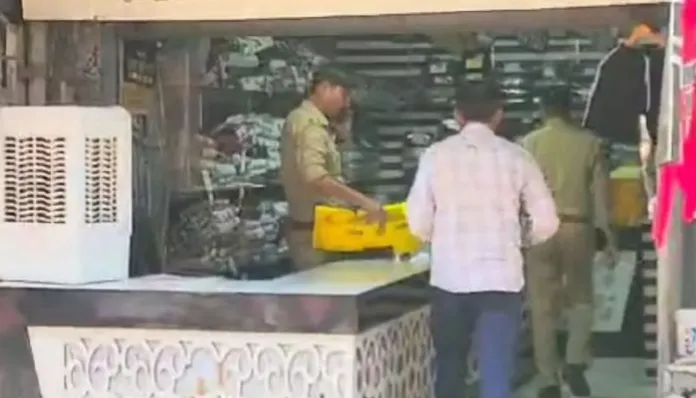In the Kosi Kalan area of Mathura district, Uttar Pradesh, a shopkeeper named Wahid Qureshi made the controversial decision to change the name of Punjabi Market to “Islamic Market” and had this new name printed on the carry bags of his garments shop. This unauthorised change sparked outrage among local traders, who quickly informed the police about the incident. Wahid Qureshi, the owner of “Trends Never Ends” shop, unilaterally decided to rename the longstanding Punjabi Market to “Islamic Market.”
On May 25, local traders were shocked to discover that carry bags from Wahid’s shop now bore the new name, “Islamic Market.” This unauthorised change was seen as a direct affront by many in the predominantly Hindu community, leading to immediate action.
Outrage quickly spread through social media channels, increasing pressure on local authorities to act.
Vishwa Hindu Parishad city president Shrikant Chaudhary and concerned traders wasted no time in alerting Inspector Ajit Kumar about the unauthorised renaming.
In response, a police team led by post-in-charge Mohit Rana raided Wahid Qureshi’s shop, confiscating 25 kilograms of the controversial carry bags and closing down the establishment.
The consequences of Wahid Qureshi’s actions were swift and severe. The Sub-Divisional Magistrate’s court promptly denied bail to Wahid, leading him to opt for a 14-day judicial custody.
Simultaneously, the Municipal Council issued a stern notice to Wahid, demanding an explanation within three days for his unauthorised alteration of the market’s name.
Reports indicate that municipality officials have discovered that the names of one or two places have been secretly changed. They have stated that strict action will be taken against those involved in such unauthorised alterations.
Nihal Singh, the Executive Officer (EO), mentioned that an investigation is underway and notices will be issued in such matters. He further added that if there is non-compliance, a complaint will be filed against the individuals responsible for arbitrarily changing the names of markets or localities.
Singh, the executive officer of the Municipal Council, highlighted the seriousness of the situation. He cited legal provisions under the UP Nagar Palika Act-1916, emphasising that only the council has the authority to officially rename markets or localities. Wahid’s actions were a blatant violation of these established norms.
In the aftermath of the controversy, the community remains deeply divided. Some Islamists sympathise with Wahid Qureshi’s purported intentions behind the renaming, while others condemn it as a reckless and provocative act. Municipal authorities have initiated a thorough investigation to look into potential unauthorised name changes elsewhere in the area.


















Comments